CTS Newsletter #4
With the first semester now well underway, CTS is pleased to share our latest achievements, updates and news in this Autumn edition of our newsletter.
We started the academic year by welcoming the third cohort of our CPD course, Translation and AI, which we are running in collaboration with the Institute of Interpreting and Translation (ITI), and we have updated our master’s programmes for 2024/25 to provide students with a future-proof education in translation, interpreting and cutting-edge technologies, including AI. Read on for full details about the CPD course and don’t miss our editorial: Is studying translation and interpreting still worthwhile when AI-driven tools are becoming ubiquitous?
And finally, a date for your diaries: our next Convergence Lecture will take place on Wednesday, 4th December 2024, from 16:00 to 17:30 (UK time). The lecture will be delivered by Professor Jan Niehues from the Karlsruhe Institute of Technology, on the topic: Did we build the Babel Fish? Open Questions in Speech Translation. For more information and registration details, please see page 2.
As always, if you would like to be added to our mailing list, please email us at CTS_inquiries@surrey.ac.uk.
CTS CPD Course: Translation and AI In collaboration with the Institute of Translation and Interpreting
Weekly 90-minute sessions | Next start date: early 2025 | 5 modules over 10 weeks
Encouraged by the popularity and success of this course we are delighted to collaborate once again with the Institute of Translation and Interpreting to bring this course to you in early 2025. Dates soon to be announced, please look out for more information on the ITI website and directly from us. If you would like to be added to the list for information about the next iteration of this course, please email CTS_inquiries@surrey.ac.uk.
Translation and AI: a done deal, right? Google, OpenAI, all other companies will take over the business of translation and they will not need translators... In this CPD course, organised in collaboration with ITI UK, Constantin Orăsan, Félix do Carmo and Dimitris Asimakoulas will show that the future will be very different from what these narratives say. We will show how translators can work with AI (neural machine translation, large language models and other natural language processing tools) to their professional advantage. Across five different modules, you will be able to participate in practical tasks and discuss case studies, which will all contribute to help you speak like a specialist in AI and to explain why, also because of AI, translation may become one of the most sought-after professions.
Is studying translation and interpreting still worthwhile when AI-driven tools are becoming ubiquitous?
We believe that as AI continues to advance, specialised skills in translation and interpreting remain essential in a multilingual world. While AI can be a powerful tool at the hands of professional translators and interpreters, it cannot replicate the creativity and intuition that skilled language professionals bring, nor the nuanced understanding needed for high-quality language mediation in demanding communicative settings. Our updated MA courses train students to integrate AI tools effectively and responsibly into expert human practice. Based on industry needs and informed by our research, our courses have a strong practical translation/interpreting component and focus on interacting with different AI language tools – from neural machine translation (NMT) and automatic speech recognition (ASR) to generative AI (e.g.,ChatGPT) – in translation, interpreting and terminology management tasks. We introduce students to natural language processing (NLP) techniques and Large Language Models (LLMs), with a focus on critically assessing the quality, risks, uses and usability of AI language tools.
Translation skills are complemented by training in machine translation post-editing and techniques to enhance translation quality and adapt translations to different user needs through advanced writing and editing. Interpreting practice is enriched with skills in using technologies that support interpreter preparation and real-time performance (e.g., electronic glossaries, digital note-taking, ASR, NMT, and generative AI) and the delivery of interpreting services (audio/video-mediated remote interpreting). Additional modules focus on hybrid practices of translation and interpreting, e.g., practices relying on speech-to-text transfer, for diverse audiences.
Translation
MA Translation and AI: Building on the expertise of the UK’s longest-running MA in Translation, this course
shapes the next generation of language industry innovators. It delivers solid, all-round translator education
tailored to the evolving demands of future language professions.
MA Translation and AI (Chinese Pathway): This new practice-orientated MA pathway—offered in collaboration
with KL Communications Ltd, led by Dr Kevin Lin OBE—is specifically tailored for students who are native or
highly proficient Chinese speakers and builds on the distinguished history of our MA Translation, enhanced with
innovative skills in cutting-edge AI.
Interpreting
MA Interpreting, Technology and AI: Building on our expertise as pioneers in remote interpreting, this course
offers skills in simultaneous, consecutive, dialogue and remote interpreting alongside training in AI-powered
language and speech technologies for interpreters.
MA Interpreting, Technology and AI (Chinese Pathway): Co-delivered with KL Communications Ltd, led by Dr
Kevin Lin OBE, this pathway, which is specifically tailored for students who are native or highly proficient
Chinese speakers, offers advanced interpreting skills, up-to-date insights into the Chinese interpreting market
and training in AI tools for interpreters.
Combined
MA Translation, Interpreting and AI: This trailblazing course combines skills in translation and consecutive,
dialogue and remote interpreting with training in the use of cutting-edge AI language and speech technologies,
preparing students for a rapidly evolving industry.
Master by research
MRes in AI for Translation and Interpreting Studies: By exploring how AI technologies integrate with human
language mediation, this course not only opens diverse career paths in the language services industry but also
prepares students for doctoral research in translation and interpreting studies, language technology and
computational linguistics.
Please click on the programme titles for more information.
CTS NEWS, UPDATES AND ACHIEVEMENTS
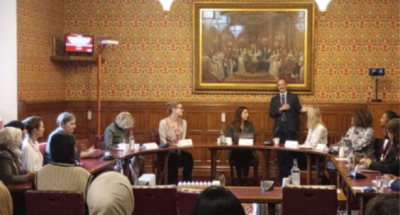
Parliamentary Visit
A CTS Surrey team including Sabine Braun, Félix do Carmo, and Graham Hieke, took part in a parliamentary workshop at the House of Lords in October. Facilitated by Policy Connect, the event brought together key stakeholders and policymakers to discuss research findings and policy recommendations from the NIHR-funded INTERPRET-X project, in which CTS is a partner. The project seeks to understand the factors influencing the uptake of interpreting services in primary care among South Asian populations in England, as well as the experiences of patients, staff, commissioners and policymakers with these services. During the workshop, participants highlighted the importance of addressing healthcare inequalities, prioritising patient safety, and providing language services that can adapt to the evolving changing needs of local populations.
Aptis Award
Emily Ruston, MA graduate at CTS, received the Award for Great Learning Gains 2024 from APTIS for her project ‘How are technological developments impacting access to the translation industry for a new generation of translators?’ We are delighted for Emily—this is a wonderful and well-deserved achievement. Congratulations, Emily! You can read more about Emily’s award on the APTIS (Association of Programmes in Translation and Interpreting Studies) website.
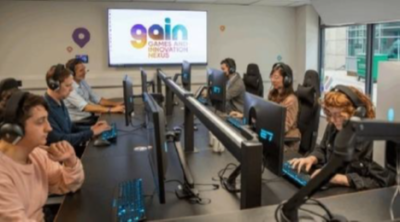
Research Award Success
Leverhulme Early Career Fellowship: In December, Diana Singureanu will begin her Early Career Fellowship with her project ‘The artificial court interpreter: Machine interpreting and fairness of justice’. Diana finished her PhD at Surrey in 2023, and we are delighted she was awarded this prestigious fellowship to continue her research in CTS. You can read more here.
AHRC Humanities-led Research Impact: Constantin Orăsan (PI) was awarded funding for his project Empowering public service interpreters with the help of automatic speech recognition (EmpASR) in the summer and work has started already on this exciting project, which will continue into early 2025. One of the main outcomes will be a course for professional interpreters focussing on how interpreters can use and customise automatic speech recognition tools to assist with interpreting assignments.
GAIN Project: Yuan Zou (PI) was awarded a research grant from the Games and Innovation Nexus at Surrey (funded by Research England) for her project ‘AI-Enhanced Game Accessibility and Inclusive Support’ (AEGIS). This project seeks to improve the accessibility of games through audio description and AI techniques, putting user needs in the centre of game design and development.
PUBLICATIONS
Wei Zhang, Elena Davitti and Sabine Braun published their article ‘Charting the landscape of remote medical interpreting: an international survey of interpreters working in remote modalities in healthcare services.’ You can read more about the article on the University of Surrey Website or read the full article here.
CTS was well represented in the Autumn issue of The Linguist, the professional journal of the Chartered Institute of Linguists, with a contribution from Sabine Braun, weighing in on the debate ‘AI: Stop or Go?’ (Alongside John Worne, CIOL CEO, Christiane Ulmer-Leahey FCIL and Katharine Allen, SAFE-AI) and an article about the risks of automated translation in healthcare, from fatal miscommunication to lack of accountability from PhD student, Eleanor Taylor-Stilgoe, Félix do Carmo and Sabine Braun. (The Linguist 63/3)
CTS research was well represented at the prestigious LREC-COLING 2024 conference with two papers at the main conference and one at a workshop:
- Andreea Deleanu, Constantin Orăsan, Sabine Braun (2024) Accessible communication: a systematic review and comparative analysis of official English Easy-to-Understand (E2U) language guidelines. In Proceedings of the 3rd Workshop on Tools and Resources for People with REAding DIfficulties (READI), Turin, Italy, pp. 70-92. (pdf)
- Hadeel Saadany, Constantin Orăsan, Mikolaj Barczentewicz, Catherine Breslin, Sophie Walker (2024) Linking Judgement Text to Court Hearing Videos: UK Supreme Court as a Case Study. In Proceedings of the 2024 Joint International Conference on Computational Linguistics, Language Resources and Evaluation (LREC-COLING 2024), Turin, Italy, pp. 10598-10609. (pdf)
- Leonardo Zilio, Shenbin Qian, Diptesh Kanojia, Constantin Orăsan (2024) Using character-level models for efficient abbreviation and long-form detection. In Proceedings of the 2024 Joint International Conference on Computational Linguistics, Language Resources and Evaluation (LREC-COLING 2024), Turin, Italy, pp. 3028-3037. (pdf)
Research carried out by Constantin Orăsan in collaboration with eBay was presented at the 33rd ACM International Conference on Information and Knowledge Management. The publication that was the basis for this presentation can be found here.
CTS contributed two chapters to the new De Gruyter Mouton Handbook of the Language Industry (edited by G. Massey, M. Ehrensberger-Dow and E. Angelone): Revisers and post-editors: The guardians of quality by Félix do Carmo (with Maarit Koponen) and Distance interpreting as a professional profile by Sabine Braun.
CONFERENCES
EST Congress 2025
We are proud to share that Sabine Braun, Director of CTS, has been invited to give a keynote at the 11th EST Congress: The Changing Faces of Translation and Interpreting Studies in Leeds in summer 2025, with a focus on technology adoption in interpreting.
CTS are also organising three panels at the conference. Félix do Carmo will co-chair one panel with Joss Moorkens and Gokhan Firat (Panel 7: ‘Changes to the economic value of translation in the face of AI’) and another one with Fábio Alves and Anna Pakes (Panel 8: ‘Changing models of translation cognition and the challenge of AI’). Elena Davitti and Sabine Braun will co-chair Panel 3: ‘AI-enabled accessibility – promoting societal inclusion via multilingual and multimodal translation’ with Gian-Maria Greco.
ARSAD 2025
Sabine Braun will be presenting a keynote at the 10th Advanced Research Seminar on Audio Description (ARSAD) in Barcelona in March 2025, to discuss the topic of AI and audio description
NETTT 2024
Constantin Orăsan was programme committee co-chair of the New Trends in Translation and Technology’ (NeTTT’2024) conference that took place in Varna, Bulgaria between 3 and 6 July 2024. The conference was well attended by representatives from academia and industry working in the fields of translation studies, linguistics, machine translation, interpreting, and natural language processing. The peer-reviewed proceedings of the conference are available online. The next edition of the conference will take place in Dubrovnik, Croatia between 24 and 27th June 2026.
Translating and the computer 2024
Constantin Orăsan will present research carried out in CTS on using ChatGPT for terminology extraction and on using automatic speech recognition to support interpreters at the Translating and the Computer 2024 conference. He will also take part in a panel discussion on ‘Training and development for AI enhanced language professionals’.
EVENTS
Careers Fair 2024
On 1 May 2024, we hosted our 8th annual careers fair for students exploring careers in the language industry or in other sectors where multilingual and intercultural communication is essential. Despite rapid advances in AI, skilled experts remain vital to supporting global and local businesses and organisations in their efforts to connect with audiences around the world. Whether it involves translating websites or marketing materials for businesses entering new markets, subtitling or audio-describing audiovisual content or live events for diverse audiences, interpreting in business, legal, healthcare or diplomatic settings to ensure access to vital services and accurate information, or even developing and managing AI tools for smooth communication in everyday contexts, we must continue to train professionals to handle the most complex and sensitive tasks.
At CTS, we do just that and are proud to educate and train the next generation of language professionals. Our annual careers fair is designed to foster relationships between the industry and CTS students, provide students with insights into career prospects after graduation, offer opportunities to network with language industry professionals and enable Language Service Providers to learn more about our degree programmes directly from current MA students.
This year, we were delighted to welcome back familiar industry colleagues and to greet some new colleagues visiting CTS for the first time. A total of nine LSPs attended the fair, representing global, regional, and local companies, and offering a wide range of language services. Our sincere thanks go to Mother Tongue, Hogarth Worldwide, Oncall Interpreters and Translators, Alpha, THG Fluently, Language Line, Transperfect, Interlanguage Translation Ltd (ILT Group) and Acolad for attending and providing our students with a first-class opportunity to engage with their potential future employers. The presentations given by the LSPs are key to helping students understand individual businesses, the place of each business within the language services industry, and the roles available for MA graduates.
A special mention also goes to four of our students, Emily Ruston, Jiaqi Zhu, Georgia Meakins, and Jiali Huo, who delivered an excellent presentation about CTS’s postgraduate degrees and the training provided by our programmes.
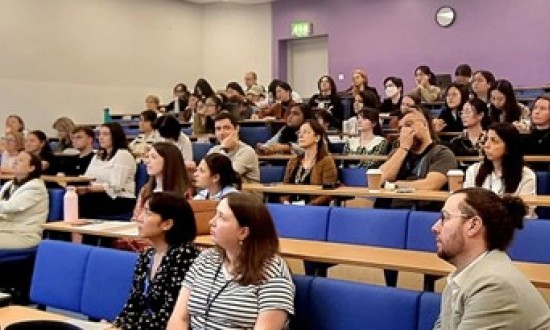
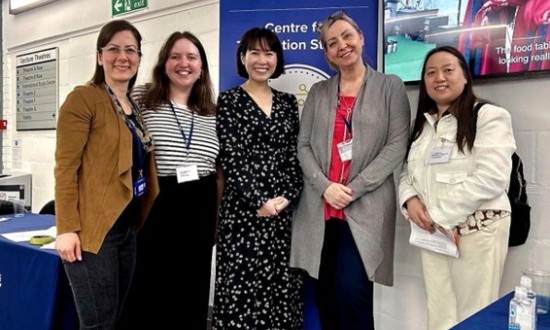
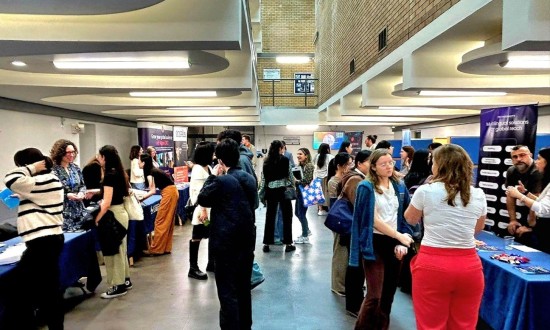
CONVERGENCE LECTURE SERIES
The latest convergence lecture in our successful online series took place on Wednesday 4th December and we are were delighted to welcome Jan Niehues who joined us online with his presentation: ‘Did we build the babel fish? Open questions in Speech Translation’.
In July we welcomed Jan-Louis Kruger to Surrey for his presentation ‘Studying reading in multimodal contexts: Subtitled film’. To view our previous convergence lectures please visit our You Tube Channel.
PhD STUDENT ACHIEVEMENTS
Completed Vivas
We are proud to congratulate five of our PhD students on successfully passing their Vivas!
Dr Gökhan Fırat: Translation work in the digital economy: Working conditions of translators on platforms and in cooperatives, supervised by Joanna Gough, Constantin Orăsan and Joss Moorkens.
Dr Francesca Frittella: Computer-Assisted Interpreting: Cognitive task analysis and evidence-informed instructional design recommendations, supervised by Sabine Braun and Elena Davitti .
Dr Jisue Park: Metaphors in comic books from Korean into English: A study of translation process and final product using different translation modalities, supervised by Dimitris Asimakoulas and Ana Guerberof-Arenas.
Dr Željko Radić: ISV - Interlingual Subtitle Voicing: A new technique for the translation of interlingual subtitles – a case study in Croatian, supervised by Elena Davitti and Sabine Braun.
Dr Eloy Rodríguez González: The use of automatic speech recognition in remote simultaneous interpreting’ supervised by Sabine Braun, Elena Davitti and Tomasz Korybski.
Meet Pratibha Joshi
It feels surreal to introduce myself as an AHRC TECHNE-funded PhD researcher at CTS because one year ago, I was pursuing my MRes in Translation and Interpreting Studies (also at CTS). Although not much time has passed in between, my experience in the two roles has been different but with a certain sense of continuity or ‘unity in diversity’.
As an MRes student, I found it fascinating to examine accessibility solutions through the lens of translation studies, which first sparked my interest in audiovisual translation. I was especially curious about video subtitling and audio describing for comics and heritage sites; surveying these topics through CTS’s interdependent and structured taught modules has been invaluable towards informing my PhD project and skills as a new researcher.
My doctoral project is a cross-institutional and global (India-UK) study that will map out good audio description (AD) practice in the museum sector by bridging activities of local stakeholders such as NGOs and non-expert AD practitioners, and new members (UK-based AD professionals), ranging from forming a ‘museum community’ to delivering AD. This entails developing bilingual museum AD among an art museum community, fostering interactions between new participants (professional AD trainers) and original members (non-expert describers), as well as gauging the impact of professional AD training on community practices and blind and partially sighted visitor response to AD texts produced in this mixed community model. Qualitative interviews and analysis of museum AD texts will be used to explore the practice.
If you would like to know more about the study, read about it at the TECHNE website or email me at pj00313@surrey.ac.uk.
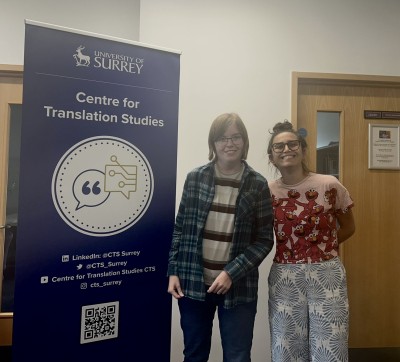
Summer Internship
Over the summer we were lucky to have a Surrey undergraduate student support one of our PhD projects. Sophie Ring worked with Andreea Deleanu and shared her experience with us.
‘This summer I have had the opportunity to work as a research apprentice at CTS, supporting Andreea Deleanu with her research on accessible cues in filmmaking. Throughout my time here I have felt that I was given a great environment in which to gain a close-up understanding of the research process, and that each task I had was explained clearly. During this project I assisted in checking over data and transcripts, handling some of the data, and assigning codes to interviews. Much of what I have done here has given me a feel for the kind of skills I would need to employ in future research opportunities.
Additionally, I was able to help other researchers at CTS with aspects of their projects, such as finding online information resources and creating video materials for interpreting. Working and interacting with everyone at CTS has given me insight into how everyone here feels about their projects and into what happens in a PhD, and I’d like to thank everyone for this experience.’
STUDY AT CTS
Our programmes are more than a masters - watch our video for information about the modules and the many language combinations we offer!
Thank you for your continued participation and support. We invite you to stay connected with us through our social media channels and to share our newsletter with your network. If you would like to be added to our mailing list, please email cts_inquiries@surrey.ac.uk.